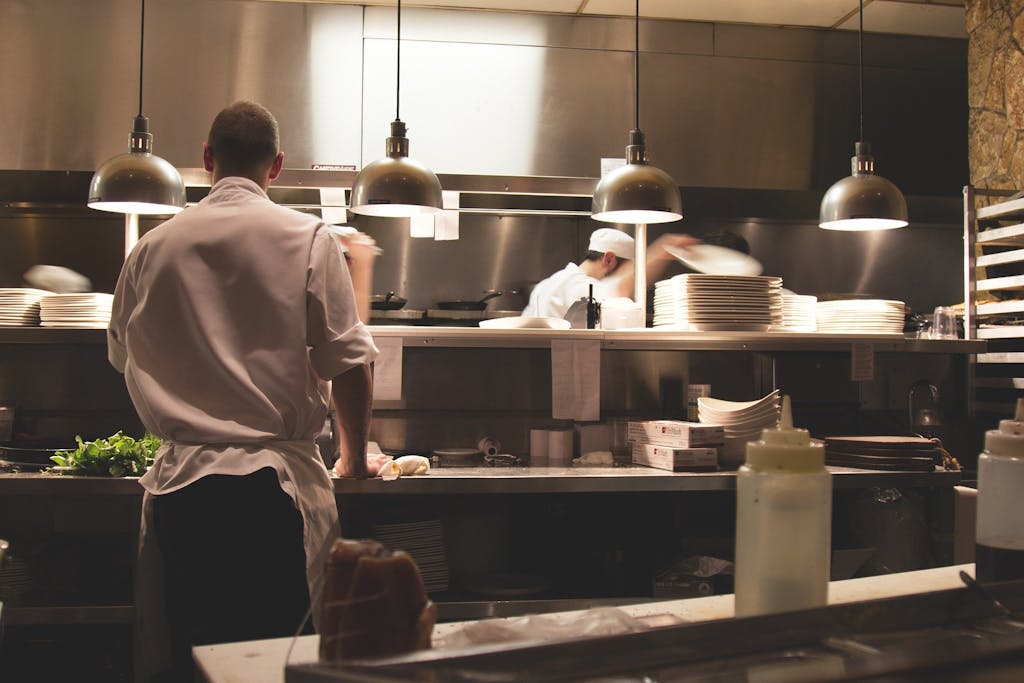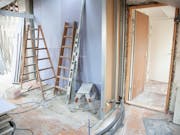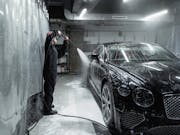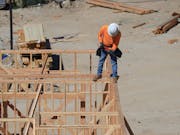Owning a restaurant and working in the service industry is as challenging as it is rewarding. There are plenty of safety hazards to look out for, while trying to keep your customers happy with your business. We have created a list of restaurant safety rules & tips to help you run your restaurant as smoothly as possible.
- About the service industry
- Restaurant safety rules
- 1. Is the location of your restaurant safe?
- 2. Is your restaurant clean?
- 3. Do you keep track of all your supplies?
- 4. Do you offer the best quality food?
- 5. Do you keep up with regular maintenance?
- 6. Are you educated in restaurant fire safety?
- 7. Who are your customers?
- 8. Have you employed the right staff?
- 9. Are your employees satisfied with their working conditions?
- 10. Are all your documents in order?
- Other restaurant safety tips
Restaurants are a big part of almost any culture in the world. For some, they are a place of comfort, a place to feel at home. For others, they are an opportunity to travel the world without leaving their city. That’s why restaurants have been around for centuries and are here to stay.
Working in the service industry is often a passing job for many. Yet restaurants are a place where you learn a lot, not only about business but also about people skills and the society we live in. A big part of all of this is protecting the safety of all involved.
As a restaurant owner, on the other hand, you bear a lot of responsibility. Most people can’t afford their business to go bankrupt. That’s why a safe restaurant, offering delicious food and excellent service, goes a long way.
About the service industry
The customer is always right. You must have heard this phrase hundreds of times. It is thought to be used first by Harry Gordon Selfridge, the founder of the famous Selfridges department store in London, UK. You might live by it too, or you might think it’s an entirely wrong perspective of the service industry, but be sure: modern customers believe it’s their right to demand and receive the best service possible. And if you are working in the service industry, you work with people closely – and people come in with all different mindsets.
Good service doesn’t mean expensive menus and a sterile venue – but rather kind and helpful staff, tasty and quality food, and a safe and comfortable environment. This is how you will create the right setting for the success of your business.
And remember:
As a worker in the service industry, you simply have to have excellent people skills and detailed safety checklists according to restaurant rules.
Restaurant safety rules
To make sure your restaurant is running as smoothly as possible and to ensure the utmost safety of your working conditions – whether you are the owner, the manager or a worker – here are some restaurant safety tips and rules to work by.
We have created them in the form of a question, to motivate your thinking and observation of possible hazardous situations. You can also create your checklist, a rulebook, or even consult professionals to conduct regular safety audits.
To repeat:
A restaurant where your customers feel safe and satisfied is a successful restaurant. There’s nothing more to it.
1. Is the location of your restaurant safe?
We are aware that the location of your restaurant depends on many factors. Not everyone can choose the spot they want, especially in the case when the business is inherited. Still, you can always try to make the best out of every situation.
Make sure your customers have easy access to your business. Some people use wheelchairs; some use strollers – you don’t want them missing out on your excellent service, right? Fix anything that can be fixed: a slippery entry, cracked stairs…
Take a look at your surroundings. Are you located in a busy business area? Do you need to have your door open at all times? Do you need to hire someone to guard the front door and help your customers in and out of place?Do you have private parking available? Do you need someone to guard it, or will you invest in a card system or just let it be?All these things need to be thought about thoroughly. If your customers find your location unreachable or hazardous, they will likely decide it’s not worth the risk.
And, by all means, whatever your location, invest in a sound security system.
This way, you will protect both your business AND your customers.

2. Is your restaurant clean?
There are no strict restaurant safety rules concerning its cleanliness, but there are recommendations. At the end of every business day, your restaurant should be cleaned thoroughly, and you should prepare a daily, weekly, and monthly cleaning checklist. You should do all that is in your power to prevent contamination, especially in this day and age, where the health of people has (finally) become a top priority in our society.
Be sure your workers, your colleagues, and you too come into work looking clean and respectful. Tattoos are nobody’s worry in this day and age: but unclean nails, untied hair, and personal clothes are. Ensure everybody has access to a clean uniform that is changed every day (and even more than that if needed).
Your restaurant should be spotless at all times, both in the front and in the back. Even if it’s a fast-paced environment serving fast food, make sure your surfaces, kitchenware, and utensils are cleaned after every service, your floors a few times a day, and your restrooms once every half an hour or so – depending on the number of people coming and going.
Of course, we all know places that don’t follow these rules strictly – but our advice to you is: don’t be that messy place.
3. Do you keep track of all your supplies?
Everyone knows about the occurrence of a restaurant owner who deals with a farmer, for example, bringing him meat from his farm. And that is all alright if you can track your restaurant’s supplies to their beginnings.
All food coming into your business should be handled properly and should have spotless labeling. The expiration date of all products must be well marked. Don’t accept anything you don’t believe rises to your standards and don’t look for the best deal on the market, offering you an unsatisfactory product.
Make sure your restaurant’s workers check the food they are handling before every service. If they are unsure something is right, make sure they don’t serve it. Sometimes things go bad even before their expiry date, due to different circumstances – if you feel something isn’t quite right, by all means, don’t serve it.
The same goes for leftover food. Make sure you are handling it right. Plenty of leftovers (like sandwiches) can be donated at the end of the day. Also, try to create a system that will be environmentally friendly. This will all work well for the reputation of your restaurant.
In short: all products coming in and all products coming out of your business must be completely traceable. If something goes wrong, this is the best way to ensure the possible repair of the damage and future prevention.
4. Do you offer the best quality food?
Sometimes fast food restaurants offer better quality food than those exclusive à la carte – hey, Asian food is known for that! So even if you are running a fast food restaurant, make sure you are offering the best possible food you can.
As mentioned above, be very careful and thorough about the origins of all your ingredients. Educate yourself and your staff about the correct food preparation and its safekeeping. Learn about the right cooking temperatures. Note that not all foods are to be stored in the same refrigerator. And do all that is in your might to prevent food contamination and store all ingredients separate.
Cleaning supplies need to be kept away from food, and used with great care – a small splash of a cleaning detergent can go unnoticed, yet contaminate food. All other equipment used with food needs to be carefully monitored. So do the leftover pits, toothpicks and things used for decoration… the list goes on.
On the positive note – don’t forget to give your staff a chance to change something up if they have a good idea. If something isn’t working, don’t force it. Create trials with new foods on the menu and see how your customers are reacting to them.
And, above all, listen to your customers and their needs.

5. Do you keep up with regular maintenance?
Working in a restaurant means working with all kinds of different appliances, depending on the type of food you’re serving. You probably know all too well how stressful it is when one of them breaks down. But apart from being troubling for your business – a malfunctioning appliance can also be dangerous and lead to a fire hazard.
That’s why it is crucial to have everything working in perfect order and regularly keep up with the maintenance. It will save you money too, as sometimes it’s already counted in its buying offer – and still, it’s cheaper than buying something completely new.
To help you do that, create a special calendar or a checklist to know exactly when it’s time for a checkup.
6. Are you educated in restaurant fire safety?
Restaurant fire safety is an important topic. After all, chances are you’re working with electrical appliances and handling high heat temperatures – open flames, even. Make sure to create rules in a restaurant that keep workers safe from fire hazards and your business overall.
Mark emergency exits well, conduct regular fire risk assessments (or hire people to do so regularly), install fire extinguishers, and train your staff to use them.
Educate yourself. Educate your staff.
You should all know what to do in case of a fire and how to prevent it. Never underestimate restaurant fire safety, as many businesses have been irreversibly ruined by doing so.

7. Who are your customers?
Knowing your customers well will help you create your own restaurant safety rules.
For example:
If you own a family restaurant that serves children regularly, be sure your venue is as child-proof as possible. In this case, learn more about dietary requirements for children and create a special menu just for them (avoid nuts and food that is hard to chew!). This will make your customers more satisfied with your service, more likely to come back and more likely to recommend it to their parent-friends.
If your customers are mostly busy business people, looking to get in and get out as quickly as possible, adjust your venue to serve them best.
And sometimes, hiring a host at the door who will double as security will help you keep your business, your workers and your customers safe while they enjoy the delicious meals you prepare for them.
8. Have you employed the right staff?
Be sure to keep your staff motivated and satisfied, however hard this may sound. People work for money primarily, and not everyone wants to create a career in the service industry. Some are just here because they need a job. And that’s okay. It really is.
Still, that doesn’t mean they should take their job lightly or carelessly. If you see someone is not doing their best: skipping out on training, ignoring your rules, and not working on creating a good connection with your clients, they are not doing your business any good.
As a new restaurant owner, it will take you some time to learn how to find the right people for your place, but once you do, you will be amazed at how much difference an excellent restaurant staff makes to the business.
After all, sometimes just a smile given at the right time can change a customer’s day for the better.
9. Are your employees satisfied with their working conditions?
Once you have created a great team within your restaurant, make sure your employees are satisfied with their working conditions as your customers are with their service.
Listen to them. Break down any tension that may exist in the workplace. Conduct regular staff meetings and offer everyone a spot in the week to talk to you in private.
Make sure they are following your restaurant safety rules and ask them for their honest opinion about the way your restaurant works. Rules in the restaurant that keep workers safe are obligatory, and they should all know them by heart – after all, it’s about making them feel secure in their working environment.
And never, never ignore them if they are trying to draw your attention to something.

10. Are all your documents in order?
To open up a restaurant business, and to keep it running smoothly, you will need all different kinds of permits and licenses. Paperwork can be stressful, so you must know as much as you can about the laws concerning your business. Again, even if you are a server, you should know your rights and obligations. Regular health checks are mandatory, and so are the audits concerning your business (like restaurant fire safety).
If you have any questions or concerns, you can always contact OSHA, the department in charge of the health and safety of your business.
Besides the fact that unsuccessful health and security inspections can have a damaging effect on your business, they can damage your restaurant’s reputation too.
Keep your documents spotless to avoid any troubles.
Other restaurant safety tips
Owning a restaurant is not an easy job, and chances are you can’t do everything on your own.
As a business owner, do your best to learn as much as possible and try and employ the right people to help you out.
Never underestimate what your workers, your colleagues, and your customers are telling you about your restaurant.
If you have any doubts about your restaurant’s safety, you can always turn to professionals to help you out – and for additional tips and rules about restaurant safety, subscribe to our newsletter!



